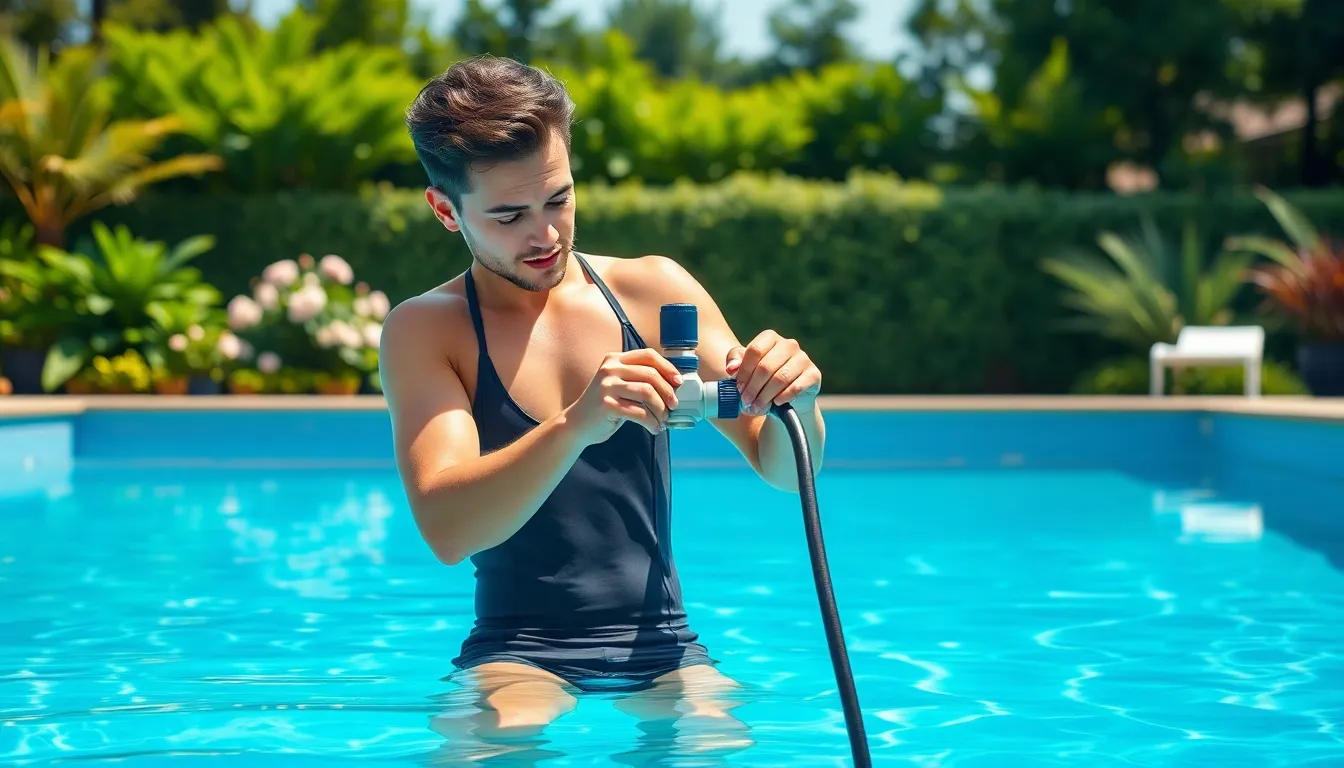Table of Contents
ToggleOwning a swimming pool is like having a backyard oasis, but it comes with its own set of responsibilities. Picture this: the sun’s shining, the kids are splashing, and you’re sipping a cool drink. But wait! Is that a suspicious green hue lurking in the water? Maintaining a pool might feel like a chore, but it doesn’t have to be a full-time job.
Importance Of Swimming Pool Upkeep
Maintaining a swimming pool ensures a safe and enjoyable experience for users. Regular upkeep prevents costly repairs that can arise from neglect. Clean water promotes health by reducing the risk of waterborne illnesses. A well-maintained pool enhances the visual appeal of a backyard, contributing to property value.
Regular maintenance tasks, such as balancing chemicals, removing debris, and inspecting equipment, play a crucial role in preserving the pool’s integrity. Weekly cleaning helps prevent algae growth and keeps surfaces free from dirt. Proper water circulation ensures even distribution of chemicals, enhancing overall water quality.
Neglecting these responsibilities can lead to significant issues like leaks or equipment failure, which often result in expensive repairs. Keeping the pool clean also extends the lifespan of essential components, like filters and pumps. Routine checks for cracks or wear in pool surfaces can prevent further deterioration.
Cost-effective upkeep practices include routine water testing and automatic cleaning systems, which save time and labor. Engaging a professional service can streamline maintenance, ensuring all tasks are performed correctly. Regular inspections provide peace of mind, confirming that the pool meets safety standards and remains inviting.
Prioritizing pool maintenance benefits both enjoyment and investment. Healthy, clean water fosters a welcoming atmosphere for family and friends. Understanding the importance of consistency in upkeep helps pool owners enjoy their private oasis year-round.
Key Components Of Pool Maintenance

Effective pool maintenance focuses on several essential tasks that enhance the safety, longevity, and aesthetic of a swimming pool. Regular attention to aspects like water quality and equipment ensures an enjoyable swimming experience.
Water Quality Management
Water quality management plays a critical role in maintaining a safe and clean swimming environment. Testing water chemistry at least once a week helps ensure proper balance. Keeping pH levels between 7.2 and 7.8 prevents irritation for swimmers and reduces damage to pool surfaces. Chlorine levels should stay between 1 and 3 parts per million to effectively kill harmful bacteria. Regularly shocking the pool—about once a month—removes buildup of contaminants. Additionally, using algaecides can combat algae growth. This proactive approach fosters a healthy swimming environment and minimizes costly repairs in the future.
Equipment Maintenance
Equipment maintenance ensures all systems function efficiently, preventing unnecessary repairs. Inspecting filters, pumps, and heaters on a monthly basis helps catch issues early. Cleaning filters regularly, approximately every two weeks, maintains water circulation and pressure. Lubricating moving parts reduces wear and tear, extending equipment lifespan. Checking for leaks in pumps and hoses twice yearly prevents water loss and costly damage. Scheduling a professional inspection annually can identify hidden issues that require attention. This diligence in equipment care upholds not just the pool’s functionality but also its visual appeal.
Seasonal Pool Upkeep Tips
Seasonal upkeep ensures a well-maintained swimming pool. Key tasks in each season prevent issues and promote enjoyment.
Spring Preparation
Spring marks the time for thorough cleaning. Remove debris, leaves, and dirt from both the pool and surrounding areas. Checking pool equipment before use is essential; inspect filters, pumps, and heaters to ensure proper operation. Water chemistry testing becomes critical at this stage. Adjust pH and chlorine levels accordingly to achieve ideal balance for safe swimming. Additionally, shocking the pool effectively combats lingering winter contaminants.
Winterization Techniques
Winterization protects the pool during cold months. First, clean the pool by removing all debris and brushing the surfaces. Lower water levels below skimmers to prevent freezing and ensure proper drainage. Apply winterizing chemicals to prevent algae growth, creating a stable environment until warmer weather returns. Covering the pool effectively prevents debris accumulation and reduces chemical use. Lastly, inspect and store equipment, ensuring it remains in good condition for the next swimming season.
Common Pool Problems And Solutions
Common swimming pool problems often arise, but solutions exist to keep pools enjoyable and safe. Addressing these challenges promptly prevents more significant issues down the line.
Algae Growth
Algae growth frequently occurs in pools, creating slippery surfaces and discolored water. Swimmers often notice green or cloudy water, indicating a chemical imbalance or inadequate sanitation. Shocking the pool with a high dose of chlorine effectively eliminates existing algae. Using algaecides prevents future growth, maintaining water clarity and safety. Regularly brushing pool walls and floors removes algae accumulations, while maintaining adequate pH levels ensures a hostile environment for algae. Skimming debris from the water daily also helps minimize nutrient sources for algae, promoting a cleaner pool.
Pump Issues
Pump issues can disrupt water circulation, leading to filtration problems and poor water quality. Low water levels or clogs in the skimmer can hinder pump function. Inspecting the pump for leaks or unusual noises aids in early detection of problems. Cleaning the pump strainer basket removes debris that impedes flow. Checking for air bubbles in the pump system suggests air leaks that require sealing. Regularly inspecting and maintaining the pool’s equipment minimizes these pump issues. Consistent professional evaluations ensure optimal performance and longevity of the entire pool system.
Maintaining a swimming pool is essential for ensuring a safe and enjoyable experience. Regular upkeep not only enhances the pool’s aesthetic appeal but also protects the investment made in it. By prioritizing tasks like water testing and equipment inspections, pool owners can avoid costly repairs and health risks associated with poor water quality.
Embracing effective maintenance practices allows for a refreshing oasis to thrive year-round. Whether opting for DIY methods or professional services, staying proactive in pool care guarantees peace of mind and a beautiful space for relaxation and fun. With the right approach, enjoying a sparkling clean pool can be effortless and rewarding.




